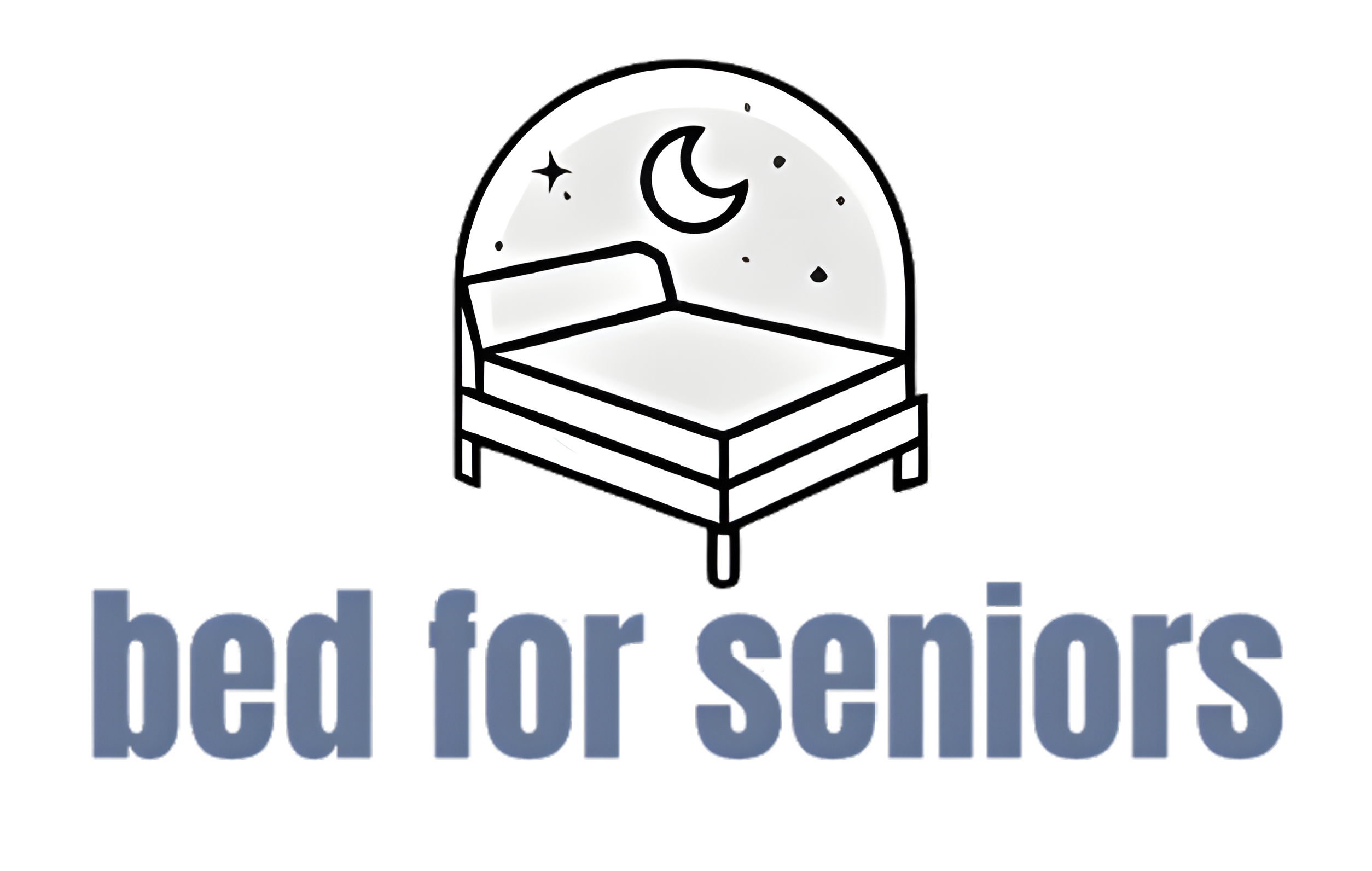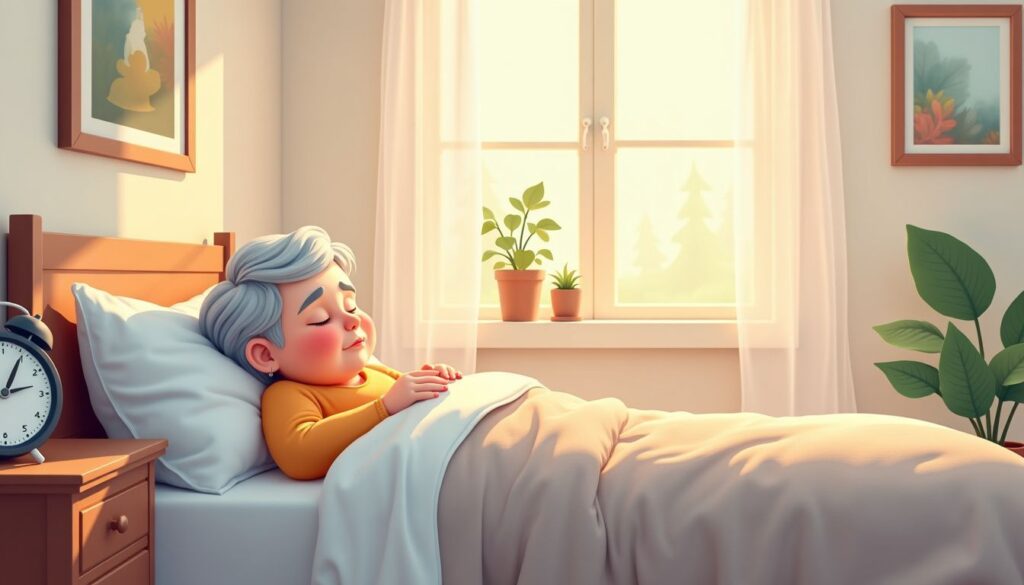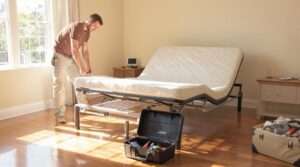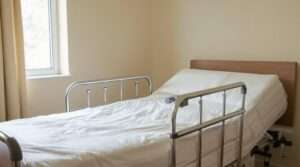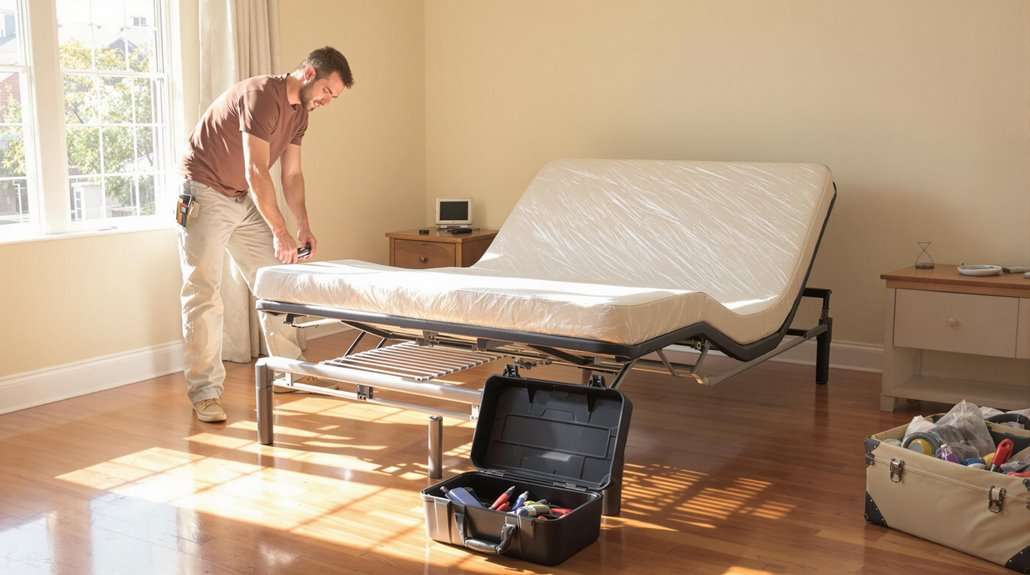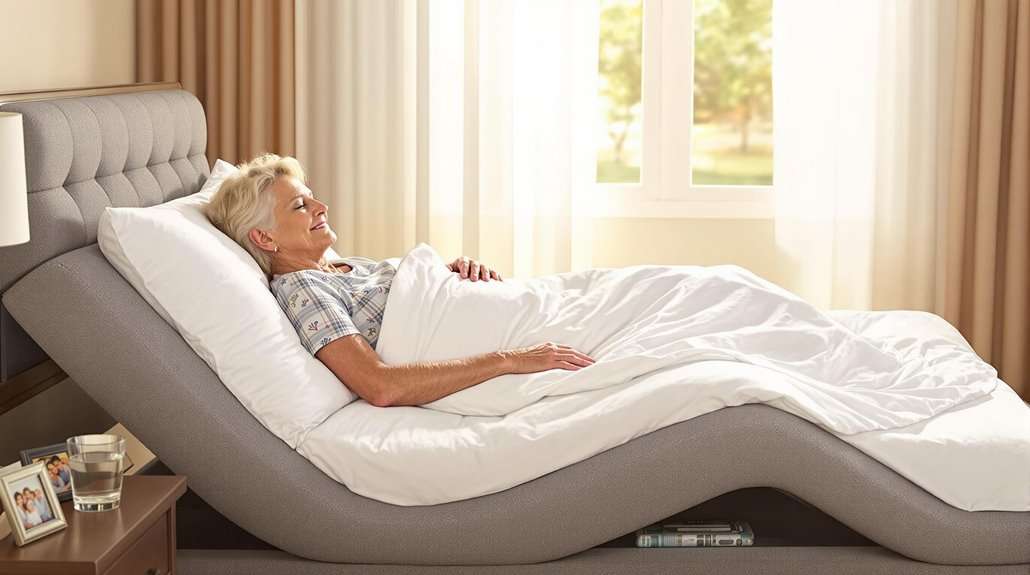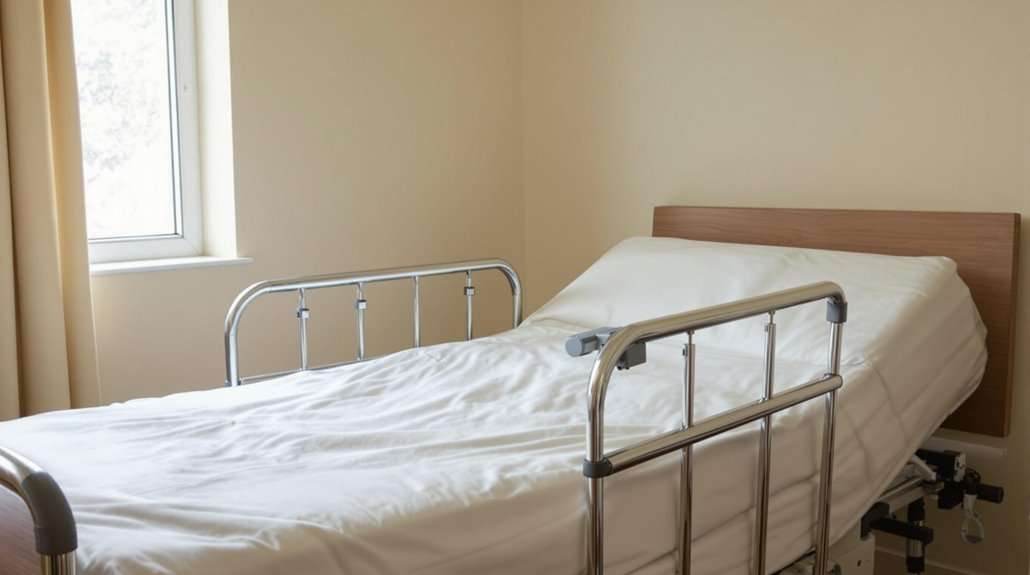Finding the best sleep schedule for elderly people can be hard. Older adults need 7 to 9 hours of sleep each night. This article will guide you in creating an ideal sleep routine for them.
Keep reading to learn more.
📋✅
- Elderly people need 7 to 9 hours of sleep at night. Going to bed early and waking up early helps them stay healthy.
- Keeping a regular sleep schedule is important. It helps their body clock work better, so they fall asleep faster and wake up rested.
- Changes in how seniors sleep, like less deep REM sleep and making less melatonin, can affect when they feel tired and awake.
- For better rest, it’s good to adjust sleeping times based on health needs. Make the bedroom quiet, dark, and cool for sleeping.
- If an elderly person has serious trouble sleeping or feels very tired during the day, it’s time to talk to a doctor for help.
Understanding the Sleep Needs of Elderly People

Elderly people need consistent and enough rest. Their bodies handle sleep differently, changing how long they sleep and how well they rest at night.
Importance of sleep consistency
Sleeping at the same time every night helps seniors stay healthy. Seniors need 7-9 hours of sleep each night. A regular sleep schedule keeps their body clock on track. This means they fall asleep faster and wake up feeling rested.
Changes in sleep, like waking up often, happen more as people get older. Sticking to a set bedtime and wake-up time can make these changes less bothersome. It also lowers the risk of sleep disorders such as insomnia or sleep apnea.
So, keeping a consistent sleep schedule is key for good rest and health in older adults.
Typical sleep duration for seniors
Most seniors aged 65 and older need 7-8 hours of sleep each night. This range fits their health needs. Yet, some may need more, between 7 to 9 hours. As we get older, we spend less time in REM sleep.
REM sleep is a deep sleep stage that helps refresh the mind. People over 65 see a drop in this kind of sleep.
Next, let’s look at how aging changes when and how well seniors snooze.
How Aging Affects Sleep Patterns
As people get older, their sleep patterns change. They often go to bed earlier and wake up earlier too. Aging makes them spend less time in REM sleep, which is deep, restful sleep.
This means their sleep can break up more during the night. Also, seniors make less melatonin. This hormone helps control when we feel sleepy and awake. Because they make less melatonin, their body clocks may not work as well.
These changes lead to feeling tired early in the evening and waking up early in the morning. During the night, they might wake up more often because of this lighter sleep stage mix—more light sleep and less deep REM sleep—and these shifts in how much melatonin they produce.
So, understanding these changes can help caregivers adjust routines to better match an elderly person’s natural sleeping habits for better rest.
Optimal Sleep Schedules for Seniors
Finding the right sleep schedule for seniors can lead to better health. They should try to stick to regular bedtimes and wake-up times, even on weekends.
Best times to go to bed and wake up
Elderly people often find sleep crucial for their health. Consistent bedtimes and wake times play a key role.
- Going to bed early, around 7-8 PM, helps seniors get enough rest.
- Waking up early, usually between 4-5 AM, aligns with their natural sleep cycles.
- Keeping the same sleep schedule every day improves sleep quality and aids circadian rhythms.
- Exposure to natural light in the morning boosts alertness and sets a healthy internal clock.
- Avoiding naps late in the afternoon or evening prevents trouble falling asleep at night.
These steps ensure seniors enjoy better rest and overall well-being.
Adjusting sleep times based on individual health
Adjust sleep times for better health. This helps with many conditions.
- Check if the person has sleep disorders like restless legs syndrome or obstructive sleep apnea. They may need to go to bed earlier.
- Look at their meds. Some cause sleep issues. Change when they take them if needed.
- Exercise is key but do it earlier in the day, not right before bed.
- If they have diseases like Alzheimer’s or heart disease, they might wake up often at night. Plan shorter sleep times at night and add naps during the day.
- Anxiety and depression affect sleep too. Help them relax before bedtime with warm milk or relaxation techniques.
- Keep a regular schedule, even on weekends, to set their internal body clock right.
- Use light smartly. Natural light in the morning helps; dim lights at night signal it’s time to rest.
- Control room temperature for comfort; too hot or cold messes with sleep.
- Make sure their bed and pillows support good sleep – think about firmness and materials.
- Address pain from conditions like arthritis with proper care before bedtime so it’s less likely to disrupt sleep.
These steps can make a big difference in how well someone sleeps, improving both their night and day life.
Challenges to Maintaining a Good Sleep Schedule
Keeping a good sleep schedule can be hard for older adults. Health issues and medicines often get in the way.
Dealing with sleep disorders
Sleep disorders like insomnia, sleep apnea, RLS, and PLMD are common in elderly people. These conditions make it hard for them to get good sleep. Medications can treat feelings of tingling or the need to move legs due to RLS.
Relaxation techniques help with involuntary leg movements from PLMD. Sleep apnea, where breathing stops briefly, is serious but treatable with devices that keep airways open.
The impact of medications on sleep is also crucial. Some medicines affect how well someone sleeps. It’s important to talk with doctors about this. They might change the medication or its timing.
Next up: how medicines play a role in sleeping patterns.
Impact of medications on sleep
Moving from sleep disorders, it’s clear that medications greatly affect sleep. Many seniors take medicines like antidepressants and beta-blockers. These can change how well they sleep.
If a senior has trouble sleeping, checking their medications is a good step.
Doctors know which drugs might cause sleep problems. They see how illness, pain, and specific medicines mix together. Always talk to a doctor if you think medicine affects sleep. This way, they can adjust the prescription or give advice on managing side effects for better rest at night.
Practical Tips for Better Sleep
To help seniors sleep better, setting a calming bedtime routine is key. Making the bedroom sleep-friendly—cool, quiet, and dark—can also make a big difference.
Creating a bedtime routine
Creating a bedtime routine helps older adults sleep better. It makes falling asleep easier.
- Set a regular bed and wake time. Stick to these times every day.
- Read or listen to soothing music for 30 minutes before sleep. This calms the mind.
- Take a warm bath in the evening. It relaxes muscles and improves sleep quality.
- Minimize screen time at night. Blue light from screens can keep you awake.
- Use low lighting after sunset. Bright lights can disturb your body’s sleep-wake schedule.
- Keep bedtime snacks light and avoid caffeine late in the day. Heavy food or caffeine can disrupt sleep.
- Make the bedroom comfortable for sleep only – cool, dark, and quiet is best.
- Write down worries or plans for the next day an hour before bed to clear your mind.
- Practice deep breathing or meditation to relax your body and prepare for sleep.
This routine reduces nighttime wakeups and helps seniors feel more rested in the morning.
Adjusting the sleeping environment
Elderly people sleep better in a comfortable room. Making the bedroom right for sleep takes a few steps:
- Keep the bedroom cool. Set the thermostat between 60 and 67 degrees.
- Reduce noise. Use sound machines or earplugs to block out unwanted sounds.
- Ensure the room is dark at bedtime. Install blackout curtains or wear an eye mask.
- Invest in a comfortable mattress and pillows that support good sleep posture.
- Place night lights and clear floors for safety, preventing falls if they get up during the night.
- Secure medicines and install grab bars near the bed to help with movement.
- Use low lighting from lamps instead of bright overhead lights in the evening hours before bed.
- Keep TVs, computers, and other screens out of the bedroom to avoid blue light exposure before sleep.
These steps help seniors get into a deep sleep, improving their health and daily energy levels.
When to Seek Professional Help
Seeing serious sleep problems? It’s time to talk to a doctor. This could mean snoring loudly, having trouble breathing at night, or feeling very tired during the day.
Recognizing signs of serious sleep issues
Elderly people often show signs of sleep issues like snoring loudly and feeling sleepy during the day. These could mean they have sleep apnea. This problem makes breathing stop for short times while asleep.
It can lead to bigger health problems, so we must pay attention. Another common issue is insomnia, where it’s hard to fall or stay asleep. This happens a lot in adults over 60 years old.
Not sleeping enough can make someone feel angry easily, forget things, feel sad, and fall down more often. If you see these symptoms in elderly people, it might be time to talk to doctors who know about sleep problems.
They can help find out what’s wrong and suggest ways to fix it.
Next up—how caregivers can help by changing the environment for better sleep…
Consulting healthcare providers
Talk to a doctor if sleep problems do not go away in 2-3 weeks. A doctor can check for sleep disorders like sleep apnea. They might suggest using CPAP machines or even surgery for serious cases.
For ongoing sleep trouble or feeling tired during the day, getting help is key.
Doctors also know about how medicines affect sleep. They can offer advice on safe sleep aids for short-term use. Yet, these are not fixes for forever. Meeting with a healthcare pro is best to handle insomnia, restless legs syndrome, and other night-time issues safely.
The best sleep schedule for elderly people is to get 7 to 9 hours of night rest. They should go to bed early and wake up early too. This matches their natural body clocks. Keeping the same sleep times every day helps a lot.
If sleep problems happen, seek help from doctors. Simple steps can improve sleep, making days better for seniors.
For further insights on how aging impacts rest, visit our detailed article: Understanding How Aging Affects Sleep Patterns.
Related Questions
1. What is the best sleep schedule for older adults?
The best sleep schedule for elderly people involves maintaining good sleep hygiene, adjusting their sleeping environment to promote restful nights, and keeping a consistent biological clock.
2. How do medical conditions affect sleep in the elderly?
Medical conditions like Alzheimer’s disease, high blood pressure, diabetes, obesity and movement disorders such as restless legs syndrome (RLS) or periodic limb movement disorder (PLMD) can cause fragmented sleep and lead to daytime sleepiness.
3. Can certain medicines improve an older adult’s quality of sleep?
Yes! Sleep medicines like zolpidem can help if lack of sleep becomes chronic. However, they should be used under a doctor’s guidance due to potential side effects.
4. Are there any specific treatments for common senior citizen’s sleeping disorders?
Treatments for common senior citizen’s sleeping disorders include continuous positive airway pressure devices or oral appliances for those with breathing-related issues during REM or non-rapid eye movement stages of their slumber.
5. Why might an elderly person feel unable to get adequate rest at night?
Factors contributing to inadequate rest among seniors include nocturia – frequent nighttime urination – lighter sleeper tendencies due to age changes in their brain’s suprachiasmatic nucleus which regulates the body’s internal clock causing jet lag-like symptoms.
6. How does one identify severe cases of disturbed slumber in aging individuals?
Severe cases are identified through polysomnogram tests that monitor various physical activities while asleep; it helps diagnose hypersomnia – excessive daytime drowsiness -, REM Sleep Behavior Disorder (RBD), and other serious disturbances affecting normal aging individual’s dream-filled rapid eye movements phases.
